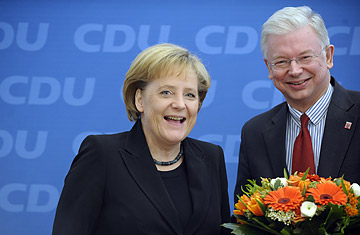
Merkel's conservative CDU trounced the centre-left SPD in the Hesse vote.
Regional elections rarely excite much attention outside the immediate locality. But there are notable exceptions and the results of yesterday's regional poll in the state of Hesse, which handed a coalition of Chancellor Angela Merkel's Christian Democrats (CDU) and the pro-business Free Democrats (FDP) a sweeping victory, is being studied closely across Germany and beyond.
Europe's largest economy — and since earlier this month the progenitor of Europe's largest stimulus package — Germany has embarked on what has been dubbed "Super Election Year," with 14 electoral contests still to go, including three more state elections, the European election, municipal elections, the election of the German President on May 23, and the federal election on September 27. (See pictures of East Germany making light of its past.)
Merkel's win in one of Germany's biggest states, a financial center and home to the European Central Bank, puts wind in her sails as she campaigns on behalf of her party and for her own re-election in September. Gerd Langguth, a political scientist and Merkel biographer, says the Hesse result means Merkel's return to the Chancellery is assured. The real question is whether Merkel will be able to form a coalition with the FDP or continue the so-called grand coalition with the left-leaning Social Democrats (SPD), he says. "Merkel believes that it would be easier to deal with the financial crisis if the SPD were locked into a grand coalition, but if there is a majority for coalition with the FDP she will grasp it."
The election in Hesse comes after a protracted period of splits and dissent in the party nationally and at state level. In Hesse, the party tried to unseat the incumbent CDU state premier Roland Koch by forming a minority government with the Greens that also depended on the tacit support of die Linken — "the Left" — an alliance of former East German communists and former members of the SPD. The attempt failed amid much acrimony, spooking moderate SPD voters, and doubtless contributed to the party's worst-ever result in Hesse, at 23.7% of the vote.
It's not all good news for Merkel. Although Koch retained power in Hesse, the CDU's share of the vote remained static. The biggest gains were posted by smaller parties like the FDP, the Greens and the Left. In such turbulent times, voters might be expected to turn out in their droves. But voter participation in Hesse was only 61%, the lowest turnout ever recorded in the state. "The federal election will depend on which parties can mobilize voters but for the moment only the small parties are doing so — especially the FDP and the Greens," said Peter Lösche, an SPD expert and political scientist.
If the Hesse results are mirrored in September, Merkel is likely to form a coalition with the FDP, in many ways an easier proposition than governing in grand coalition as she has done since 2005. But the strength of the FDP will make it harder now for Merkel to act quickly to counter the growing economic and financial crisis. The grand coalition of CDU/CSU and SPD unites the biggest parties in the center and the left of the political spectrum and has until now wielded sufficient power to pass laws in the lower house of parliament and then rubber stamp them in the upper house, which represents the 16 federal states. But after Hesse, that cozy system is history.
Now in five state governments, the FDP has elbowed its way up to the table and can block laws in the upper house. FDP chairman Guido Westerwelle, who meets Merkel this week for talks, is eager to test his new power by forcing Merkel to revise her €50 billion economic stimulus package to include deeper income tax cuts and fewer cash incentives to consumers, such as the €2,500 handout designed to persuade Germans to trade in their old cars for new models. Whether or not Westerwelle prevails, the shifting balance of power will have an impact in Germany and beyond its borders.
